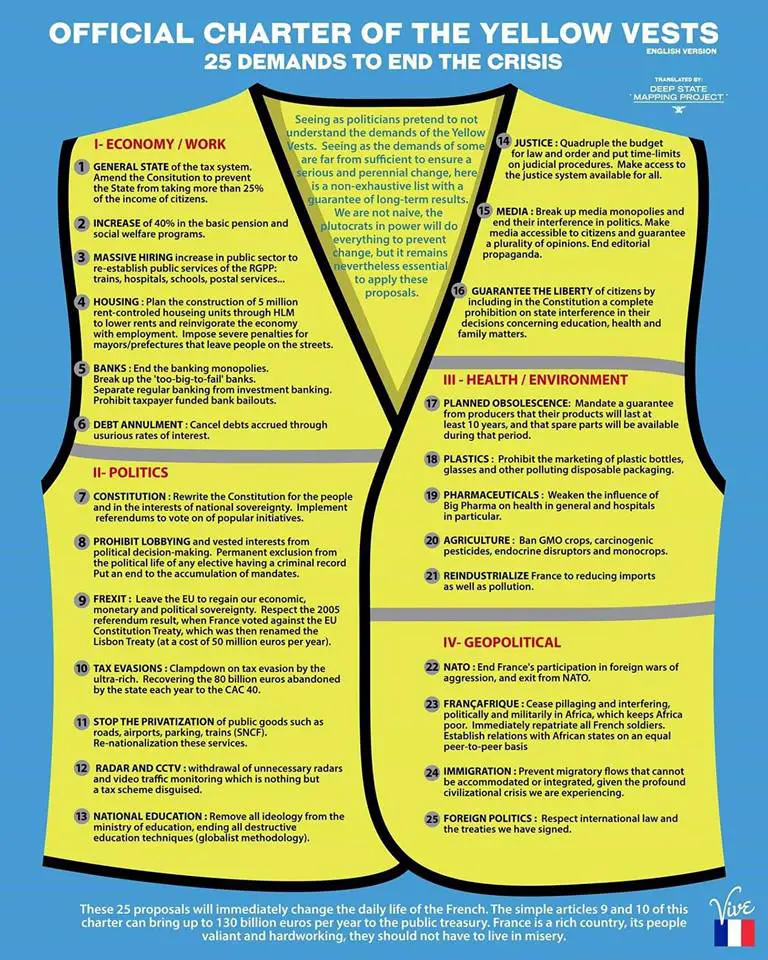The Demands of the Yellow Vest Movement are Heading Towards Real Systemic Change
by Phillip J Watt, The Mind Unleashed:

(Opinion Editorial by Phillip J. Watt) Long story short; French citizens have revolted for the fourth week in a row calling for changes in governmental and corporate design. Even though UN Military and thousands of French police have been deployed in response, the police have actually been filmed removing their helmets in solidarity with the French people.
In this light, all police, military personnel, teachers, doctors, social workers, academics, journalists, bureaucrats, politicians and other people who work within the system (as well as everyone else) should attempt to truly understand what this increasingly global movement is actually about and stand with the people who are attempting to facilitate genuine change in our troubled world.
Moving on, the mainstream media have generally limited their reporting on the demands of the ‘Gilets Jaunes’ (Yellow Vests) to a rejection of a fuel tax, raising the minimum wage and the removal of the Prime Minister, Emmanuel Macron.
And of course there’s been a disproportionate focus on looting and other ‘uncivil’ behaviour.
However, the independent media is telling a more comprehensive story than the mainstream platforms, which comes as no surprise. After all, ‘fake news’ isn’t just false reporting, it’s also the dishonest dissemination of information such as lying by omission.
To make it clear, the protests are now also about pro-nationalism and anti-globalism, as well as ‘Frexit’ (the French exit from the European Union). They also reject the propaganda of the mainstream media, debt owed to the EU, austerity in general and the ill-conceived carbon tax.

However, it didn’t start off that way. The Yellow Vest Movement (YVM) did arise from a rejection of the fuel tax, but after Macron more or less offended the entire nation by calling them ‘thugs’ it was the straw that broke the camel’s back for the French. This saw the wave grow into tens if not hundreds of thousands of dissenters, which is now being referred to as the ‘French revolution 2.0’.
We should not just admire, but learn from the French’s rich history of activism and their current application of it.
To be fair though, there’s the good, the bad and the ugly with the YVM. They want real change for the good, which is the good. The bad is that they haven’t yet identified the key priorities required for real systemic change. The ugly is the looting – which violates the Non-Aggression Principle (NAP) – and other counter-productive behaviour.
Moreover, during the past month the YVM has spread to many other European countries, including Belgium, the Netherlands, Germany, Sweden, Italy, Poland and Serbia. It’s also beginning to spread to the US, Canada, Australia and New Zealand, and even the Middle East. As it continues to grow across the world, as is argued below it needs to be done with a clear, universal focus to actualise real, systemic change.

The Demands of the YVM
Larger lists have emerged which may not necessarily represent all of the French revolutionists, but there’s some really well-thought-out demands here which help them not just as a whole, but different demographics too (including the homeless and the police). It’s actually very civil.
And that’s definitely a requirement in their rebellion; if you don’t have an agreed message that is reasonable in the context of your cultural standards then no amount of street activism will have the desired effect.
The Spread of the YVM
Many people around the world feel in similar ways too, hence the expansion of the YVM. Moreover, it’s not just the ‘conspiratorial subculture’ who believes there’s really big flaws with the design of our governments (including how they’ve allowed private stakeholders to monopolise banks and industry at the public’s expense); it spreads right throughout the masses too.
For example, the older generations have been aware of the corruption and lies for decades. The younger generations are ‘woking’ themselves, even if it’s generally coupled with a narrow or misguided focus. And then of course there’s a large, penetrating group of deeply inspired and passionate people of all ages who have peered beyond the veil of officialdom and therefore see the world through a larger lens.
Yet, there isn’t a coherent agreement among the people. Sure, huge proportions of the population reject the way things work in different ways, but the problems and therefore solutions are different according to each person you talk with.
We CAN capture the general vibe though; populist dissent is against the political and corporate elite.

The Key Issues
As stated in a previous article, the so-called elite have inflicted untold suffering on us, such as by:
- turning the money supply into a debt-based model which has enslaved the world’s people to a system which funnels much of the resources directly to them;
- hijacking the banking infrastructure so that most of the profits made by what should be a public utility are not reinvested into local communities, but instead are further enriching themselves;
- monopolizing medicine so that natural and cheap substances are either vilified or suppressed, which are then replaced with toxin-rich derivatives from plants and bacteria, as well as synthetics in general, that can be patented and sold at prices which further deprive the people of not just their wealth, but their health too;
- infiltrating governmental affairs so that macro policy decisions are determined by either the puppets they situate, or the corporate lobbyists who write the policy and package it with ‘legal’ donations; and
- using their corporate-controlled media to shape the mindset of the masses with false and harmful narratives on life.
In other words we have a corporatocracy, not a democracy. Let that sink in properly for a moment.
Therefore, as I’ve written several times before, if we want real change within our social system we need to focus on the 4M’s, which are Money (banking and finance), Medicine (prescriptive and preventative practice, including food), Management (education and government policy) and Media (informed choice and authentic public discourse). I’ll elaborate on this a little later.
The Key Values
Let’s see if we can actually agree on something by starting with the core values we should align with. I’ll make this short and sharp. The six key values are:
- Love over hate;
- Truth over lies;
- Freedom over enslavement;
- Happiness over suffering;
- Justice over injustice; and
- Peace over war.
The Key Principles
Again, this needs to be simple and straightforward:
Read More @ TheMindUnleashed.com
Loading...



